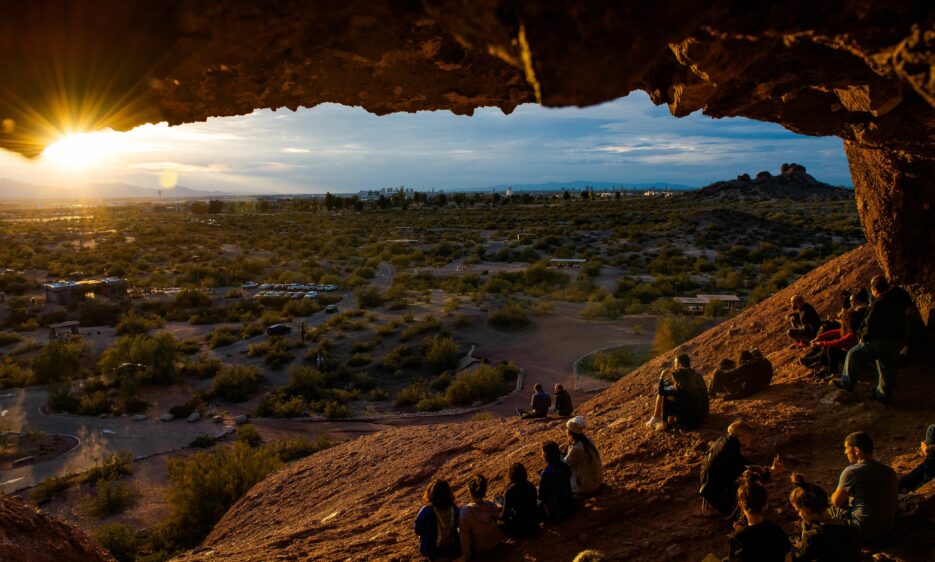Past CSPO Events
- May 25, 2022CSPO DC - New Tools for Science Policy
Advancing Climate & Natural Resource Policy Through Peer-to-Peer Knowledge Exchange
Building networks in the Pacific Islands through the Pacific RISA
Just as the impacts of climate change are felt locally, effective plans and policies for climate resilience are often implemented locally. The extent to which resilience planning best practices are shared among decision makers depends on multiple factors, including the availability of human and financial resources and the relevance, legitimacy, and accessibility of the knowledge.
In this New Tools seminar, Victoria Keener will share examples of how the Pacific RISA is using its role as a science and policy boundary organization and the P2P framework with different stakeholder groups to advance and accelerate climate adaptation initiatives and policies that consider climate data and models, regional geopolitics, social equity, and financial risk.
Victoria Keener
- May 23, 2022CSPO DC
Webinar: What Is Biosecurity for the Twenty-First Century?
After September 11 and the anthrax attacks in 2001, the United States adopted a top-down governance structure for bioterrorism that famously employed “guns, gates, and guards” to prevent attacks, while keeping track of suspicious “insiders” who might cause harm. But today, after the emergence of the novel coronavirus and its variants, society’s idea of what constitutes biological security and safety is changing. Looking toward a future in which gene editing can be done by do-it-yourselfers, biological engineering is common, and environmental changes shape new biorealities, the old top-down model of biosecurity will not be up to the task.On May 23 at 3:00 PM ET, join Melissa Haendel (University of Colorado Anschutz Medical Campus), David Gillum (Arizona State University), Sam Weiss Evans (Harvard Kennedy School), and Yong-Bee Lim (Council on Strategic Risks) to discuss how to reimagine biosecurity and biosafety—and even the relationship between biological research and society—for a new era. - April 28, 2022CSPO DC
Imagining COP60: Scenarios, Sci-fi, and Policy Tools in Post-Normal Fiction
Last year’s COP26 was one of the most widely followed events in the history of climate politics. Though new, more ambitious agreements were reached, the world was left with big questions about whether nations would be able to limit global warming to 1.5°C—and how we will adapt to the changes and climate chaos coming.
In his debut book, Our Shared Storm: A Novel of Five Climate Futures, climate fiction author Andrew Dana Hudson imagines the five possible futures for the COP and climate politics. Inspired by the IPCC’s Shared Socioeconomic Pathways scenarios, which were used in the recent Sixth Assessment Report, the stories examine the cultures of climate policy making in futures that range from hopeful to harrowing. The book also includes non-fiction discussions of the opportunities and challenges of writing climate fiction and using stories to advance policy thinking.
Andrew Hudson
- April 22, 2022CSPO DC - New Tools for Science Policy
Broadening STEM Participation in Rural and Remote Communities
Cultivating regional STEM hubs in rural Arizona communities

Kalman Mannis
- April 12, 2022CSPO DC - New Tools for Science Policy
No Help Wanted: Outside Technical Advice for the US Military
John Alic
- March 24, 2022CSPO DC
Webinar: Vannevar Bush, Engineer of the American Century
Vannevar Bush’s influence on the history and institutions of US science and technology is unrivaled, but he remains relatively unknown outside wonky science policy circles. G. Pascal Zachary, Bush’s biographer and editor of a new collection of Bush’s writings, The Essential Writings of Vannevar Bush (Columbia University Press, 2022) talks with historian of science and technology Emily Gibson about this remarkable figure, and why Bush’s pioneering insights and lucid writings deserve a wide audience today.
G. Pascal (Gregg) Zachary
- March 21, 2022CSPO DC - New Tools for Science Policy
Framing Our Biological Futures
Preliminary Results from U.S. Public Engagement Forums
Genome editing techniques have rapidly advanced in the past two decades. Recently, the CRISPR/Cas9 system has made this technology more accessible, precise, and less expensive. This has opened the door for wider use, but also raised many questions about ethics, morality, risk, and inequalities. How should this suite of technologies be used? Under what conditions? How should it be governed? The scientific community alone cannot answer these questions.
Arizona State University, Baylor College of Medicine and the Museum of Science, with funding support from the National Institutes of Health and the Kettering Foundation, worked with experts and stakeholders to create a series of informed national citizen deliberations around the ethics and governance of genome editing. These deliberations with diverse members of the general public held in Boston, Phoenix, Waco and online in Fall 2021, offer early insight into the public values around the future opportunities and challenges with these technologies. On March 21, join the project team as they share preliminary insights and results gathered from these national deliberations and launch a broader conversation about how these results and public engagement approaches can inform research, engagement and governance of human gene editing.
Cynthia Selin, Christopher Scott, David Tomblin, Janine Myszka , Lauren Lambert, Haley Manley, Dorit Barlevy
- December 17, 2021CSPO DC
Webinar: Does Engineering Education Need a Revolution?
The basic structure of engineering education was set in 1955 and hasn’t changed much since. Rather than hands-on problem solving, classes emphasize theory, while a “pipeline mindset” perpetuates a system designed to keep people out rather than welcome them in. How can engineering schools connect their curricula to solving the broader social justice, equity, and environmental issues that motivate today’s students?
On December 17 at 3 PM ET, join past president of the American Society for Engineering Education Sheryl Sorby, current ASEE executive director Norman L. Fortenberry, and Gilda Barabino, president of the Franklin W. Olin College of Engineering, for a discussion moderated by Chemical & Engineering News science news editor Jessica Marshall on what it will take to prepare tomorrow’s engineers for our digital, diverse, global, and rapidly changing society. Register today!